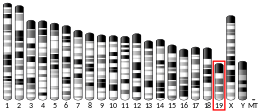Protein found in humans
4F2 cell-surface antigen heavy chain is a protein that in humans is encoded by the SLC3A2 (solute carrier family 3 member 2) gene .[ 5] [ 6]
SLC3A2 comprises the heavy subunit of the large neutral amino acid transporter (LAT1 ) that is also known as CD98 (cluster of differentiation 98).[ 7] [ 8]
^ a b c GRCh38: Ensembl release 89: ENSG00000168003 – Ensembl , May 2017^ a b c GRCm38: Ensembl release 89: ENSMUSG00000010095 – Ensembl , May 2017^ "Human PubMed Reference:" . National Center for Biotechnology Information, U.S. National Library of Medicine .^ "Mouse PubMed Reference:" . National Center for Biotechnology Information, U.S. National Library of Medicine .^ Teixeira S, Di Grandi S, Kühn LC (August 1987). "Primary structure of the human 4F2 antigen heavy chain predicts a transmembrane protein with a cytoplasmic NH2 terminus" . J Biol Chem . 262 (20): 9574–80. doi :10.1016/S0021-9258(18)47972-0 PMID 3036867 . ^ "Entrez Gene: SLC3A2 solute carrier family 3 (activators of dibasic and neutral amino acid transport), member 2" .^ Kucharzik T, Lugering A, Yan Y, Driss A, Charrier L, Sitaraman S, Merlin D (2005). "Activation of epithelial CD98 glycoprotein perpetuates colonic inflammation". Lab. Invest . 85 (7): 932–41. doi :10.1038/labinvest.3700289 . PMID 15880135 . S2CID 19733993 . ^ Lemaître G, Gonnet F, Vaigot P, Gidrol X, Martin MT, Tortajada J, Waksman G (2005). "CD98, a novel marker of transient amplifying human keratinocytes". Proteomics . 5 (14): 3637–45. doi :10.1002/pmic.200401224 . PMID 16097038 . S2CID 31954787 . 




